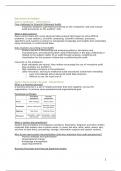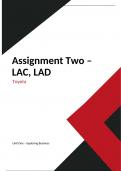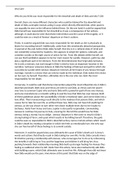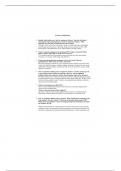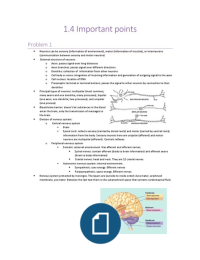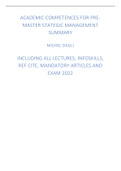Ruimtelijke Onderzoeksmethodes
1. Methodologie en Onderzoeksproces
Dit opleidingsonderdeel: nadruk op empirisch onderzoek
Behandelde onderzoeksmethodes en methodologieën gebruikt in diverse disciplines
- Methodologie: algemene aanpak
- Methode: concreter
Methodologie
Surveyonderzoek
Stap 1: onderzoeksdoel omschrijven
Onderzoeksvragen
- Beschrijvingsprobleem -> beschrijvingsvragen
- Verklaringsprobleem -> waarom-vragen, oorzaak-gevolg, hoe komt het dat
- Voorspellingsprobleem -> wanneer-vragen
- Therapieprobleem -> remedievragen (welke), evaluatievragen
- Ontwerpprobleem -> hoe-vragen
Onderzoeksvraag (nodige criteria):
- Onderzoekbaar
- geeft vaak aan welk empirisch onderzoek nodig is
- voldoende precies
- levert theoretische bijdrage en maatschappelijke relevantie
- gebaseerd op theorie
,Onderzoeksvragen: voorbeelden
- "What is the relationship between PT [public transport] accessibility at the residential
location and car ownership among first-time parents, and does this relationship vary with
Household income level?"
- "Is TU [tactical urbanism] congruent with the ‘open’ and vibrant city, a city that celebrates
incomplete and ‘open’ urban forms and allows spontaneous activities and diverse
interactions?"
- "RQ1. What is the level of relationship that Seoul residents have with familiar strangers in
their neighbourhoods?
- RQ2. What are the individual-level factors that make residents’ relationships with familiar
strangers different from one another?
- RQ3: Does localised ICT use positively or negatively affect the level of relationships with
local familiar strangers?"
- "How are firms’ innovation activities linked to changes in their urban neighbourhoods due to
firm dynamics, particularly when firms producing new knowledge (R&D based firms) are
moving in or out of the neighbourhood?"
- "why do non-profit [childcare] providers locate their facilities predominantly in
neighbourhoods with a high socio-economic status, even though public funding, which
covers a large fraction of production cost, is the same in all neighbourhoods? And do all
non-profits behave the same?"
- "How does social cohesion vary, over time, among key cultural agents such as musicians,
while urban policies become increasingly marketised and tourist-oriented?"
Stap 2: conceptueel model uitwerken
'Hij heeft een theorie, dat is goed. Het is tenslotte altijd beter een theorie te hebben.'
Voorbeelden conceptueel model
,
,
1. Methodologie en Onderzoeksproces
Dit opleidingsonderdeel: nadruk op empirisch onderzoek
Behandelde onderzoeksmethodes en methodologieën gebruikt in diverse disciplines
- Methodologie: algemene aanpak
- Methode: concreter
Methodologie
Surveyonderzoek
Stap 1: onderzoeksdoel omschrijven
Onderzoeksvragen
- Beschrijvingsprobleem -> beschrijvingsvragen
- Verklaringsprobleem -> waarom-vragen, oorzaak-gevolg, hoe komt het dat
- Voorspellingsprobleem -> wanneer-vragen
- Therapieprobleem -> remedievragen (welke), evaluatievragen
- Ontwerpprobleem -> hoe-vragen
Onderzoeksvraag (nodige criteria):
- Onderzoekbaar
- geeft vaak aan welk empirisch onderzoek nodig is
- voldoende precies
- levert theoretische bijdrage en maatschappelijke relevantie
- gebaseerd op theorie
,Onderzoeksvragen: voorbeelden
- "What is the relationship between PT [public transport] accessibility at the residential
location and car ownership among first-time parents, and does this relationship vary with
Household income level?"
- "Is TU [tactical urbanism] congruent with the ‘open’ and vibrant city, a city that celebrates
incomplete and ‘open’ urban forms and allows spontaneous activities and diverse
interactions?"
- "RQ1. What is the level of relationship that Seoul residents have with familiar strangers in
their neighbourhoods?
- RQ2. What are the individual-level factors that make residents’ relationships with familiar
strangers different from one another?
- RQ3: Does localised ICT use positively or negatively affect the level of relationships with
local familiar strangers?"
- "How are firms’ innovation activities linked to changes in their urban neighbourhoods due to
firm dynamics, particularly when firms producing new knowledge (R&D based firms) are
moving in or out of the neighbourhood?"
- "why do non-profit [childcare] providers locate their facilities predominantly in
neighbourhoods with a high socio-economic status, even though public funding, which
covers a large fraction of production cost, is the same in all neighbourhoods? And do all
non-profits behave the same?"
- "How does social cohesion vary, over time, among key cultural agents such as musicians,
while urban policies become increasingly marketised and tourist-oriented?"
Stap 2: conceptueel model uitwerken
'Hij heeft een theorie, dat is goed. Het is tenslotte altijd beter een theorie te hebben.'
Voorbeelden conceptueel model
,
,


